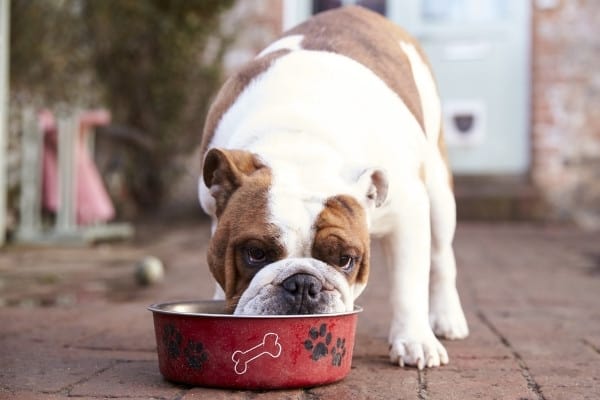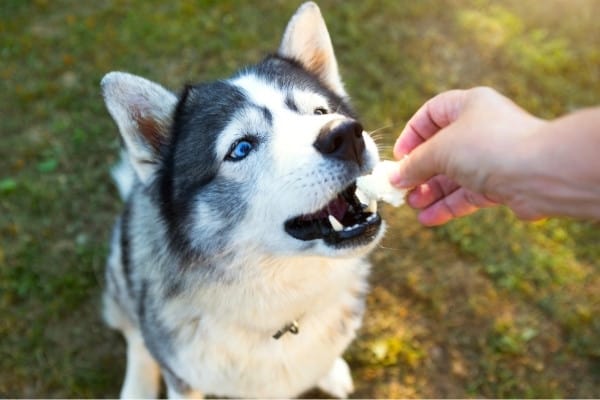
It’s easy to understand why stray dogs are always prowling for their next meal and seem to constantly be hungry, but what about dogs living in a loving home who are routinely fed a nutritious diet?
Is it normal for a dog to always appear hungry or be willing to snarf up whatever looks halfway edible?
Why do dogs always want to eat? It is normal for dogs to be eager to eat, but in the case of those who always seem to be hungry, the reason is likely due to the instinctive mentality of “eat when you can.” Inadequate diets, stress, and medical issues can also contribute to increased appetites.
It’s reasonable to believe that dogs do have a sense of when they’ve eaten enough and are full.
After all, many dogs manage a free-feeding plan well and others are perfectly content with one or two small meals per day.
This, however, doesn’t explain why some dogs always want more and never seem to be satisfied. There are actually multiple reasons for this behavior, which we’ll explore below.
Why Dogs Always Want To Eat
Not every dog has a voracious, insatiable appetite, but many seem to.
In fact, some dogs will happily consume items not considered edible (like garbage, decomposing animals, and “treats” in the cat’s litter box) in a seeming attempt to satisfy their ever-present hunger.
Are they really hungry, though? Probably not. It’s more likely that one of the following reasons is driving them to always want to eat.
Instinct
The most plausible explanation has to do with a dog’s natural instinct.
You see, regardless of how many years they’ve been domesticated, dogs have a powerful instinct to eat whenever food is available.
This goes back to when they were required to hunt, scavenge, or fight for every morsel of food.
Experience taught them that food was not guaranteed every day, so they better eat while it’s available or face possible starvation.
This “eat whenever you can” mentality was passed down or taught through the generations and is often still evident in dogs today, even if they’re fed regularly.
Food Smells and Tastes Good
Tantalizing smells and tasty tidbits are hard to resist (I’m sure you can relate – I know I can), and dogs are affected in much the same manner.
Increased salivation and hunger pangs are triggered by yummy smells and tastes, and this leads to a strong desire to eat.
As is the case with people, this sudden drive to eat often overrides any existing feeling of fullness, and overeating often results.
Considering the fact that canines have a highly developed sense of smell, it’s no wonder that they’re always wanting more food.
Nutrient Deficiency
For dogs who exist on a subpar diet, chances are good that vital nutrients are lacking.
In addition to resulting in overall poor health and a host of medical conditions, this can also lead to a constant feeling of hunger.
Dogs suffering from malabsorption issues may also become nutrient deficient, even if fed a nutrient-dense diet.
As well as an increased appetite, nutrient deficiency can also manifest as skin and coat problems, decreased immune function, lethargy, and many other issues.
Too Few Calories
A dog’s calorie needs depend not only on size but also on how much energy is exerted each day.
If your dog’s extremely active, he’ll require more daily calories than a dog of similar size who is less active.
Dogs who aren’t receiving sufficient caloric intake will naturally be hungry as their bodies signal the need for more food.
Reinforced Behavior

Dog owners all too often unknowingly reinforce bad habits in their dogs, especially when it comes to food.
Tossing a tidbit from your plate, allowing them to eat dropped food, letting them lick the dinner plates… sound familiar?
These actions teach the dog to expect food often. The more the dog is given throughout the day, the more he’ll come to expect.
Owners typically interpret this expectation as genuine hunger and give in to the dog’s request, thus establishing a pattern.
Stress
Stress eating in dogs can be similar to what people experience, but the motivating factors can be quite different.
Perhaps the most common scenario is when a new person or dog moves into the home.
Many dogs view this as a threat to their security and will respond by eating more, likely in an attempt to get the food before the “opponent” does.
Any big change in a dog’s life, like the loss of a loved one or moving to a new house, can trigger overeating behaviors.
Eating out of boredom falls into this category as well.
Past Experience
Dogs who have been adopted from a shelter or rescue often come with an unknown history.
Perhaps they were underfed when young, existed off scraps while living on the streets, or had to compete with numerous other dogs for a few bites of food.
Whatever the case, dogs often have a hard time forgetting previous experiences like near starvation and will always jump at the chance to eat practically anything.
Medical Concerns
Although relatively uncommon, certain medical issues can cause your dog to experience hunger pangs more often than usual.
- Hyperthyroidism – An overactive thyroid can cause excessive hunger and thirst as well as diarrhea, anxiety, rapid breathing and heart rate, weight loss, and increased urination.
- Cushing’s Disease – Also called hyperadrenocorticism, Cushing’s involves the overproduction of cortisol. Symptoms include increased appetite, thirst, and urination; lethargy; thinning skin; hair loss; and abdominal swelling.
- Diabetes – Diabetes is more common in middle-aged and senior dogs but can occur in young dogs too. The most common symptoms are increased appetite, excessive thirst and urination, and weight loss.
- Exocrine pancreatic insufficiency – This pancreas disorder leads to poor digestion and an inability to process nutrients correctly. Excessive appetite, weight loss, fatty stools, and chronic diarrhea are common with this condition.
- Medication Side Effects – Some prescribed medications can cause an increase in appetite, particularly corticosteroids and anticonvulsants.
- Intestinal Parasites – While signs of intestinal worms include lethargy, vomiting, weight loss, and anemia, an increased appetite is often noted as the body is continuously robbed of nutrients.
How To Handle Your Dog’s Huge Appetite

If you suspect that your dog’s appetite is abnormal in any way, it’s time to head to the vet for a checkup.
Be sure to explain your specific concerns so that the vet will know what to test for. Ask for guidance on portion size and your dog’s daily calorie needs.
Once any and all medical issues have been addressed or ruled out, you can shift your focus to managing your dog’s appetite in a healthy way.
- Use slow-feeder bowls.
- Make every bite count by feeding only high-quality foods.
- Offer food only at mealtime or when training.
- If you must offer snacks, stick to raw or cooked dog-safe fruits and veggies.
- Increase your dog’s fiber intake to help him feel full longer.
- Provide more mental stimulation and exercise to ward off boredom.
- Instead of feeding one or two meals per day, split the recommended portion into four or five separate meals.
- Use distractions to divert your dog’s attention away from food.
- Instead of rewarding your dog’s good behavior with food, reward him with verbal praise, a brushing session, a long walk, fetch, etc.
Final Thoughts
It’s not easy to practice tough love with our dogs, but it really is necessary. Stop offering snacks, dog bones, and all other treats except during training sessions.
Your dog needs to understand that food will be provided only at specific times during the day and that mooching is not rewarded.
Be sure that every family member is on board with the plan, and stick to it. In time your dog will adjust, and his waistline will thank you!
Sources:
https://www.mypetnutritionist.com/post/does-my-dog-have-a-vitamin-deficiency
https://www.yourpetmd.com/pet-health/general-health-concerns/-hyperthyroidism/
https://www.fda.gov/consumers/consumer-updates/treating-cushings-disease-dogs
https://www.akc.org/expert-advice/health/diabetes-in-dogs/
https://vcahospitals.com/know-your-pet/exocrine-pancreatic-insufficiency-in-dogs




